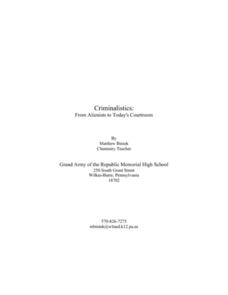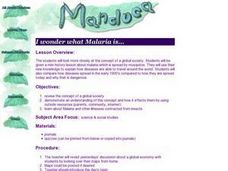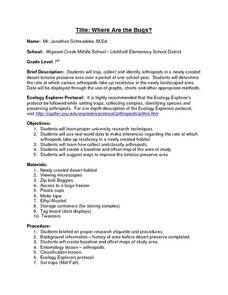Cornell University
Too Much of a Good Thing?
Continuing their study of beneficial insects, young entomologists discover where in the world some of these bugs are. By labeling, coloring, and using the scale on a map, pupils explore the territories and arrival of the Asian lady...
Curated OER
I Wonder How the Manduca Life Cycle Compares To the Human Life Cycle...
Students study life cycles including developing their understanding of the human life cycle. They decide where they are in the human life cycle and provide reasons for that placement. They compare the human life cycle to that of the...
Curated OER
Manduca
Students study the definition of a "global society". They take this knowledge and speculate about the positive and negative ramifications of living in a global society.
Curated OER
I Wonder How Fast Manduca Grows Compared To Me
Students study the Manduca bug and its growth data. They look for patterns and compare their own growth rate to that of the Manduca.
Biology Junction
Arthropods
Even the creepy crawlers have pretty amazing anatomy! A thorough lesson describes characteristics of arthropods with an emphasis on their structures. Beginning with a review of the taxonomy hierarchy, the lesson explains the different...
Curated OER
The Effects of Water Quality on the Growth Rate of Freshwater Mussels
Students participate in a field and laboratory study to determine if local freshwater mussels are environmentally stressed.
University of Kentucky
Beneficial Bug Scavenger Hunt
Many people think of bugs as annoying pests to be squashed, but most insects and spiders are beneficial, eating the actual pests or pollinating plants. After reviewing some of the common bugs in your area (they may differ from those...
Curated OER
Going Buggy!
Young scholars study bugs over a four week period. In this insect collection of activities, students observe insects covering basic science concepts and skills, such as classification, observation, and responses to habitat....
Curated OER
Science: Entomology in Action
Young scholars discover how coroners use insect life cycles to estimate the time of death in cases. they describe how forensic entomologists combine environmental factors with insect life cycles to note the changes. Students examine an...
Curated OER
Insects: Bugs, Science, Entomology
In this lesson, insects are explored through reading of children's literature, classifying insects versus non-insects, drawing and painting various insects, and learning how to clap to certain rhythms while reciting insect names.
Curated OER
Activity Plan 5-6: Bugs, Bugs, Bugs!
Learners become entomologists for a day. In this life science instructional activity, students go on an insect hunt and investigate insects and their homes. This leads to the creation of an insect by each student. Lesson includes a...
Curated OER
Spider Safari
Today we are talking about one of the stealthiest, sneakiest, and most intriguing insects of all times, the spider. Learners will examine the predatory nature of these super bugs as they conduct a spider safari survey. Each child will...
Curated OER
Beneficial Bug Scavenger Hunt
Going on a scavenger hunt sounds like a great way to spice up any lesson plan. To better understand how beneficial insects are, the class goes outdoors to search for and observe a bug that has big benefits. Included in the lesson plan...
Curated OER
Science: Criminalistics - A New Look at Crime
Students examine the world of forensic science, focusing on fingerprint analysis. In the lesson, they implement a method by which fingerprints of class members are categorized and identified. Elementary students study classification...
Curated OER
Insects A-Z!
Alphabet insects! Who has ever heard of such a thing? Get ready because your class is going to research insects that start with a specific letter of the alphabet. In small groups, they'll use the Internet and reference texts to locate...
Curated OER
The Great Spider Debate
Students study about the survival and hunting strategies of several different kinds of spiders. They also be introduced to scientific classification of spiders and write a brief report about one of the spider families they observe.
Curated OER
The Queen's Empire
Eighth graders study insects and make observations about their habitat. in this insect research lesson students research the Internet to compile information on ants.
Curated OER
Did You Say Water Bugs?
Second graders observe live specimens of aquatic insects in a water habitat. They study specimens from both moving and still water with the naked eye and a hand lens.
Saddleback College
The Wonder of Words
If your language arts students think etymology isn't relevant to their everyday lives, show them a presentation that will prove them wrong! The slideshow provides explanation about various words, roots, and suffixes that have adapted in...
Curated OER
World History: Chronology
Learners examine periods of time throughout world history. In this time chronology lesson plan, students read and create time lines. Learners complete a variety of activities involving the ordering of events in time.
Curated OER
Manduca
Students investigate the basic survival needs of both hornworms and humans. They compare and contrast the them by making a class list.
Curated OER
I Wonder What Malaria is
Students examine the disease malaria. They compare how diseases were spread in the early 1900's compared to how they are spread today and discuss why that is dangerous. They take a survey to see how much they know about insects that...
Curated OER
Where Are the Bugs?
Young scholars trap, collect and identify arthropods in a newly created desert tortoise preserve area over a period of one school year. They determine the rate at which various arthropods take up residence in the newly landscaped area....

























